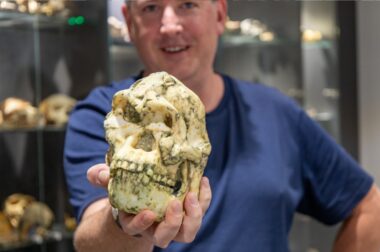The Great Barrier Reef remains off the United Nations' World Heritage Committee (WHC) list of in-danger sites - the decision was made overnight at the 46th WHC session in India.
Each year UNESCO reviews the latest research on the state of the Reef and assesses measures taken by Australian governments to protect and preserve the largest living structure on Earth, UNESCO then makes a recommendation to the WHC - the draft decision this year came with a call for stronger emissions reduction targets. The WHC has urged Australia to increase its climate targets to be in line with limiting warming to 1.5 degrees, and it’s given the government 6 months to report back; it has also asked Australia to report back on mortality from the 2024 coral bleaching event which is the worst on record.
There have been five mass coral bleaching events on the Great Barrier Reef in the past nine years, with global ocean temperatures breaking heat records every day of last summer - scientists tell us this kind of stress doesn’t allow coral species time to recover, and many say the Reef has now reached a tipping point, with fundamental changes occurring to its biodiversity and ecological function.
Australia’s leading reef experts are available for interview:
Professor Scott Heron, UNESCO Chair on Climate Change Vulnerability of Natural and Cultural Heritage, physical scientist at James Cook University,
Dr Heron has expert knowledge on how the World Heritage Committee assesses the climate vulnerability of world heritage sites. This involves working with the UNESCO World Heritage Centre and its advisory bodies. He can also talk about the impacts of heat on the marine ecosystem – including coral bleaching and disease, reef resilience and conservation management, within the context of climate change.
Location: India at the World Heritage Committee 46th session, available for zoom interviews, (noting IST being 4.5 hours behind AEST)
Dr Lissa Schindler, Great Barrier Reef Manager, Australian Marine Conservation Society
Dr Schindler is a marine ecologist who has over a decade of experience working on the threats that impact the Great Barrier Reef. She has worked in coral reef conservation both in Australia and overseas and can speak to the impacts of bleaching as well as the solutions for the Reef and the current concerns of the World Heritage Committee.
Location: India at the World Heritage Committee 46th session, available for zoom interviews, (noting IST being 4.5 hours behind AEST)
Dr Schindler said: “The World Heritage Committee has once again put Australia on notice for its management of the Great Barrier Reef, including its inadequate climate policies. While our current government is making an effort to roll out renewables to reduce climate pollution, we still have a long way to go to reduce Australia’s dependence on fossil fuels and improve our land management in the reef catchment, especially in regards to land clearing.
“The WHC have specifically told the Australian government to create climate policies in line with 1.5 degrees of warming to keep the Reef off the list of in-danger sites, as our emission reduction targets are still not on track to save the reef, with the WHC recognising current efforts are not ambitious enough despite our government saying that it is.
“It’s also worth noting that the Committee has told Australia to report back by February on coral mortality from the record-breaking 2024 mass bleaching event, as we still don’t have final figures on how much coral perished in the extreme water temperatures of last summer.”
Dr Ove Hoegh-Guldberg FAAS - Professor of Marine Studies at the University of Queensland
Dr Hoegh-Guldberg was the Founding Director of the Global Change Institute and previously Deputy Director of the ARC Centre for Excellence in Coral Reef Studies, and an Affiliated Professor in Tropical Marine Biology at the University of Copenhagen. Ove’s research focuses on the impacts of global change on marine ecosystems and is one of the most cited authors on climate change. Ove has had a 30-year history in leading research organisations such as the Centre for Marine Studies (including 3 major research stations over 2000-2009) and the Global Change Institute. He was one of the first scientists to identify the serious threat posed by climate change for coral reefs in a landmark paper published in 1999, which predicted the loss of coral reefs by 2040.
Location: Brisbane
Dr Hoegh-Guldberg said: “After decades of studying the world's largest coral reef in all its glory, and then to witness its demise as sea temperatures increase due to a changing climate is terrifying. Adding to this is the endless and frustrating politics and opinions that circle around the death of these vital ecosystems.
“What we must do is listen to what the science is telling us: The Great Barrier Reef is in mortal danger and will disappear over the next few decades unless we take meaningful action. Current actions are meaningless unless we deal with real action on phasing out fossil fuels. No amount of trying to regrow coral populations will be effective if we don’t double and triple down on eliminating greenhouse-emitting activities.”
“The Australian Academy published a report on climate impacts in Australia. As a country, we need to face up to the fact that the current emission of greenhouse gases will deliver up to a climate that is 3oC over the Pre-Industrial period. That is well above the Copenhagen Agreement of 1.5oC above the Pre-Industrial period and hence we must try much harder. Current efforts are clearly not solving the problem”.
“If we are serious about saving the Great Barrier Reef and the associated World Heritage site we must eliminate our reliance on coal, oil and gas reserves as soon as possible. The current evidence runs counter to this - with greenhouse warming marching relentlessly upward over the past 100 years!’
“The impacts on coral reefs like the Great Barrier Reef underscore the urgency. There have been five mass coral bleaching events on the Great Barrier Reef in the past nine years, with global ocean temperatures breaking heat records every day of last summer - this kind of stress doesn’t allow corals and coral reefs to recover in time, and the Reef has now reached a tipping point, where fundamental and irreversible change has begun to impact its biodiversity and ecological function.
“While these discussions go on, and politicians are patting themselves on the back, the reef continues to rapidly decline. The solution is straightforward - to reduce the further warming of our oceans we must stop digging up and burning coal, oil and gas. Putting an end to our obsession with fossil fuel and stopping climate pollution at the source is one of the key actions we can take to halt the warming of our oceans and give our Reef a fighting chance.”
“I am appalled by today’s decision which has sent the false message that the Great Barrier Reef is somehow not ‘in danger’. This is pure poppycock and is extremely dangerous!”
Dr Selina Ward, The University of Queensland.
Dr Ward is an expert in the response of corals to environmental stress, the effects of bleaching on coral reproduction and the recovery process of corals following bleaching. Selina is also a board member of AMCS.
Location: Brisbane.
FOR INTERVIEWS: CMC senior media advisor Sean Kennedy: 0447 121 378 - [email protected]
Contact details:
Climate Media Centre
Sean Kennedy: 0447 121 378 - [email protected]


